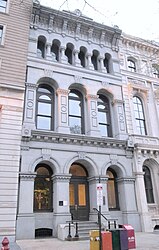
American Philosophical Society
The American Philosophical Society (APS) is an American scholarly organization and learned society founded in 1743 in Philadelphia that promotes knowledge in the humanities and natural sciences through research, professional meetings, publications, library resources, and community outreach. It was founded by Benjamin Franklin and is considered the first learned society in the United States.
For the learned society of American philosophers, see American Philosophical Association.Location
Philosophical Hall, the society's headquarters and a museum, is located just east of Independence Hall in Independence National Historical Park. In 1965, in recognition of the building's history, it was designated a National Historic Landmark.
The society has about 1,000 elected members. As of April 2020, 5,710 members had been inducted since its creation. Through research grants, published journals, the American Philosophical Society Museum, an extensive library, and regular meetings, the society supports a variety of disciplines in the humanities and the sciences.
Awards[edit]
In 1786, the society established the Magellanic Premium, a prize for achievement in "navigation, astronomy, or natural philosophy," the oldest scientific prize awarded by an American institution, which it still awards. Other awards include the Barzun Prize for cultural history, the Judson Daland Prize for Outstanding Achievement in Clinical Investigation, the Benjamin Franklin Medal, the Lashley Award for neurobiology, the Lewis Award, and the Thomas Jefferson Medal for distinguished achievement in the arts, humanities, or social sciences.
Publications[edit]
The society has published the Transactions of the American Philosophical Society since 1771. Five issues appear each year. The Proceedings have appeared since 1838; they publish the papers delivered at the society's biannual meetings. The society has also published The Papers of Benjamin Franklin, Joseph Henry, William Penn, and Meriwether Lewis and William Clark. Jane Aitken bound 400 volumes for the society.[10]
The society also has an expansive archive on framer of the U.S. constitution John Dickinson.[11]
APS has a collection of indigenous language documents from around the United States including the ACLS Collection (American Council of Learned Societies Committee on Native American Languages, American Philosophical Society)[12] recordings of the Odawa language from northern Michigan. APS has created a guide[13] to help provide broad coverage of the Native American and Indigenous archival collections at the Library & Museum of the American Philosophical Society. These materials date from 1553 to 2020 and include manuscript, audio, and visual materials relating to Indigenous peoples throughout the Americas.
The society also has a collection of manuscripts on the history of the British colonies, Revolutionary War, the history of American science, quantum physics, Charles Darwin and evolution, genetics and the history of technology.[14]


